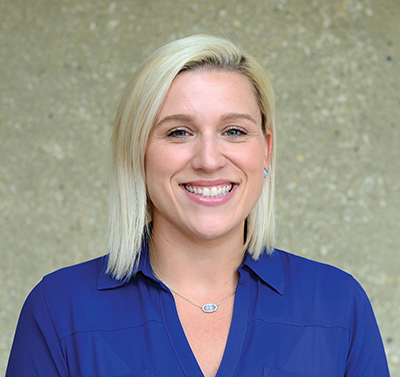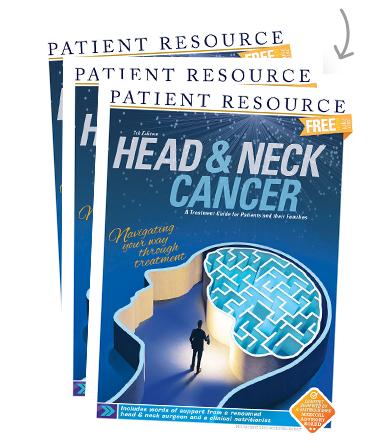Head & Neck Cancer
Nutrition
Getting the nutrients and fluids your body needs to heal from treatment may require a new approach for how and what you eat. A dietitian can work closely with you to help you manage these changes. Though it sounds daunting, do not let it overwhelm you. Your dietitian and the other members of your care team know exactly how to help.
While you are still able to eat normally, you are encouraged to consume more protein and calories to better prepare your body for treatment.
During Treatment
Using enteral (EN-teh-rul) nutrition (tube feeding) is common during or after treatment for head and neck cancer. It is a temporary or permanent method for getting your necessary nutrients. It may be your only source of nutrition or it may supplement the food you eat by mouth.
A tube is placed directly through your abdomen and into the stomach or intestine. The formula that goes into the feeding tube is a liquid mixture to maintain strength and fuel the healing process. It can be given in several “meals” throughout the day (also called bolus feeding), or a specific amount can be delivered over a certain amount of time through a special pump. In the hospital, your health care team will manage this for you. If you need to continue (or begin) this type of feeding at home, you will be trained on the process.
As You Heal
Once you are able to take food by mouth, the consistency of that food will gradually change. The goal will be to get back to eating solid foods, and it will happen at your own pace. These are the basic diet types:
- Clear liquid diet: Liquids that are easily digested and generally see through. They can quench your thirst and may help relieve treatment side effects, but you will never be able to get all the nutrition you need from just a clear liquid diet.
- Full liquid diet: Foods that are smooth and can be poured. A thickening agent can adjust the thickness of the liquid for easier swallowing.
- Puréed or blenderized diet: Foods that are puréed in a blender.
- Soft diet: Foods that are easier to chew and swallow. They can often be mashed easily with a fork.
- Regular diet: Includes all food groups.
- Nutritional supplements: These can accompany any type of diet to help maintain the nutritional status your body needs. Be sure to read labels to find high protein, high calorie options.
Dining Out
Getting on with your life may include eating out. Ask your speech pathologist what you can do to help you feel comfortable eating in public. These suggestions may also help:
- Choose a restaurant that offers selections you can eat easily.
- Reserve a table that allows for more privacy.
- Ask that your water glass be kept full.
- Request that half your meal be cut into small pieces and placed in a carryout container.
From the Dietitian’s Desk
Proper nutrition is part of your treatment plan

Bethany Wendland, MS, RD, CSO, LD
Clinical Dietitian Specialist | Board Certified Specialist in Oncology | The University of Kansas Cancer Center
Nutrition will be a valuable part of your treatment and recovery, and it will be very important to have a partner by your side early on. Ideally, you will meet with a dietitian on day one to help you understand the challenges ahead. If your cancer center does not have a dietitian on staff, ask for a referral. The dietitian can provide many resources and help you overcome any barriers you have.
Because of the nature of head and neck cancer treatment, your relationship with food will change, specifically what you eat and how you eat. “Healthy diet” takes on a new meaning. Typically, we recommend avoiding things such as heavy creams and butter. Not anymore. Because weight loss will naturally occur with your treatment, keeping weight on, however you can, will become a goal.
Your body needs extra nutrients during treatment, and being well-nourished helps make your recovery faster and easier. Your physician may encourage you to eat a high calorie, high protein diet before treatment begins and continue for as long as you are able to eat normally once treatment is underway.
Your dietitian can recommend the best foods to include in your diet. You may have used high protein/low calorie drinks to stay fit, but now you will need high protein/high calorie drinks.
For many people, there comes a time when they must rely on enteral nutrition (tube feeding) because they can’t get all the nutrition they need by mouth. People are often fearful about tube feeding, so your dietitian will introduce the concept early on to help you get into the right mindset. Think of nutrition as a type of treatment, and tube feeding as a tool to help you be successful.
Your dietitian will show you how to administer a feeding and how to care for the tube. Many people go home with their feeding tube and can easily manage it alone or with the help of a caregiver.
Keep in mind that the more weight you lose, the longer it will take to recover. Too much weight loss could turn a 3 to 6 month recovery time into one that takes 9 to 12 months.
Your dietitian will see you regularly, whether as a hospital inpatient or when you come in for treatments, and will be by your side every step of the way.



